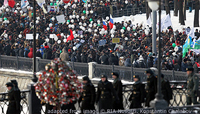Public’s Desire to Protest Hits Record Low

(Moscow Times – themoscowtimes.com – Gabrielle Tétrault-Farber – May 14, 2014) Amid the ongoing crisis in Ukraine and lingering patriotic fervor following Russia’s annexation of Crimea, a poll published on Tuesday showed that Russians are more reluctant than ever to participate in political protests.
The Levada Center, an independent research organization, found that a record high 85 percent of Russians would likely not take part in political protests. The poll, which was based on the opinions of a representative sample of 1,602 adults across 45 Russian regions, also revealed that 95 percent of Russians had not participated in protests in the past year.
The same poll conducted in late April after President Vladimir Putin’s approval rating soared to 82 percent showed that 79 percent of Russians think political protests were “unlikely” to take place in their community. This figure, whic h carries a 3.4 percent margin of error, has increased by 34 percent since 1999.
Dmitry Gudkov, an opposition State Duma deputy and leading figure in the mass protests that followed Putin’s re-election in 2012, linked this record high reluctance to protest to Russia’s approach to the situation in Ukraine.
“Russia’s domestic policy is being conducted through Ukraine,” Gudkov told The Moscow Times.
“The population’s reluctance to protest does not mean that it is necessarily happier or more satisfied. Citizens are just being distracted from domestic problems by state authorities’ insistence on the presence of foreign enemies in Ukraine and the West,” he said.
Gudkov said it was only a matter of time before Russians took a greater interest in political demonstrations.
“There will come a time when authorities will no longer be able to distract Russians from the problems at home,” Gudkov said.
“The wave of patriotism after t he annexation of Crimea will last another six months, but when economic issues become more serious and affect people’s lives more significantly, we will start to see people take to the streets again,” he said.
Human rights organizations and political activists have also attributed the decline in protest sentiment to the tightening of the country’s legislation on organizing public events. Three Duma deputies proposed in late March to impose criminal sanctions on repeat offenders of Russia’s laws against unsanctioned public gatherings.
Human Rights Watch Europe and Central Asia director Hugh Williamson said in a statement at the time that this initiative showed Russian authorities’ desire to “criminalize public criticism.”
Russia’s law on demonstrations was last amended in 2012 when activists faced fines for violating regulations on public events. The move was widely seen as a way to stifle the opposition and discourage the public from participating in protests.
For pro-Kremlin analysts, however, the population’s ongoing reluctance to protest is evidence of Russia’s healthy political system.
“The Occupy Wall Street movement went to the streets because it did not have the proper channels to express itself in the political arena,” said Konstantin Kostin, the former deputy head of the internal politics of Russia’s presidential administration.
“Russia offers many different avenues to voice political opinions. They do not necessarily have to be expressed on the street,” he said.
Kostin cited electoral candidates’ access to the media and the ease of founding a political party as examples of the political system’s “openness.”
